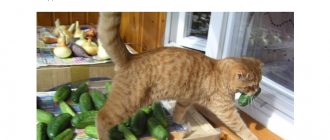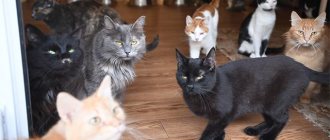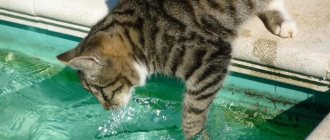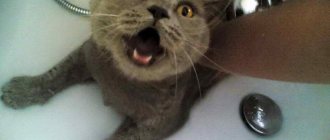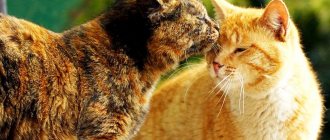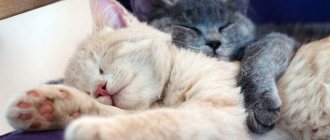Dogs
It is known that cats cannot stand dogs. This is justified by the fact that cats and dogs express their emotions in different ways, contradictory to each other.
The way cats express their emotions angers dogs and because of this, there is eternal enmity between these animals.
For example, when a dog expresses friendliness, it waves its tail in different directions. A cat makes these same movements when it experiences opposite emotions.
Or when a dog is happy, it rises on its hind legs, but if a cat is preparing to attack, it arches, thereby increasing in size. Therefore, cats perceive the friendliness of dogs as aggression.
What does a scared cat look like?
Cats show the full range of emotions. Owners can easily determine what mood their pet is in right now. Just take a closer look at their body. When a cat is frightened, it arches and its fur stands on end. She may begin to hiss and beat her tail violently.
A frightened cat presses its ears back, and lowers its tail and tucks it between its hind legs, which at this moment are in a half-bent state. If the animal does not have time to escape, it lies down on the ground, while leaving its head raised. His eyes are wide open and his claws are extended.
If you try to grab a cat by the tail in a moment of fright, the animal may have a heart attack. Therefore, there is no need to bring the cat to such a state and you need to try to protect him from this.
Water
People who have cats have often noticed that their pet, at the sight of water and the upcoming swim, tries to run away and hide in a quiet place. But if it still ends up in the water, then a more pitiful animal cannot be found.
All this is explained by the fact that cats are terribly afraid of getting wet. In cats, the undercoat creates an air cushion that saves animals in heat and cold.
Wet cat fur can lead to illness because thermoregulation is disrupted. In addition, a cat's fur has an odor that can scare away prey.
Coming out of the water, the cat tries to dry out as quickly as possible. He begins to shake himself frequently and licks his fur nonstop.
The eternal question of cats' loyalty
Cat loyalty: myth or reality?
Such special cat devotion
Dogs are considered more loyal to their owners, but many cats are in no way inferior in devotion to humans, and are very afraid of losing him. Therefore, when a stranger comes to visit, or a child or other animal appears in the family, the cat may behave in a completely unfamiliar way.
A pet can easily rush at a guest, hiss at him, scratch him, and leave a bad mark in a variety of places. The thing is that cats are jealous, and when new faces appear in the environment of its owner, they are afraid that the owner will forget about them.
Cats are owners
From my own example, I can confidently say that cats are owners. When my “cat” family received an addition in the form of a little kitten Dolechka, the old-time cats, seeing how I stroked her and played with her, immediately began to deliberately climb onto the table, throw off keys, tubes of creams, chew wallpaper and create everything for which I scold them. As soon as Dolechka left my arms, the “mayhem” stopped, and they immediately lay down next to me and calmly dozed.
Noise from hair dryer and vacuum cleaner
Cats have increased hearing sensitivity. Loud and sharp sounds frighten the animal very much. It is especially important for the cat owner to remember that under no circumstances should you joke with the animal by scaring it with the vacuum cleaner on.
If a cat is hiding from loud noises, you should not try to pull it out of a secluded place. It is necessary to let the cat sit and recover.
The cat will come out on its own as soon as it is sure that the danger has passed. There are times when a cat begins to rush and attack an object that makes a frightening sound, defending itself. The sounds that a cat may be scared of may be the following:
- - hail, thunderstorm, strong noise of trees from the wind, etc.
- -vacuum cleaner, hair dryer, electric meat grinder, mixer, etc.
- -fireworks, firecrackers, doorbell, loud phone ringing.
Meeting with a veterinarian
Just as children are afraid of doctors, cats are afraid of veterinarians.
Fear of the veterinarian is an individual phobia. I have had to take my pets to the vet, and each of them reacted differently to the doctor. Some growled and covered their ears, some remained indifferent, and some even purred.
Once, I had to give vitamin injections to cats myself, which is a rather unpleasant procedure. The injection had to be made in the muscle of the back leg. At the sight of a syringe, the pets ran away like cockroaches, but after the course of treatment they completely calmly allowed us to stroke and touch any part of their body. But here is one cat, which has a calm and affectionate character, and still, if you even lightly touch his back leg, he becomes crazy, aggressive, rushes and hisses.
Smells
In addition to hearing, cats have a very highly developed sense of smell. Cats smell much more strongly than humans.
Therefore, strong and pungent odors can irritate the cat's receptors. This reaction in cats is at the level of instincts.
It is not for nothing that there are stories where a cat helped its owner avoid trouble. The animal raised the alarm and woke up its owner because it detected a slight smell of ash and smoke.
It is worth paying attention if a cat cleans and rubs its nose with its paw, then perhaps it smells a foreign odor. Smells that irritate cats can come from the following things:
- -oranges, lemons, tangerines—cats cannot stand the smell of citrus fruits
- -shampoos, deodorants, eau de toilette
- -glue, paint, varnish
- -vinegar, alcohol, medicines
New in blogs
What are cats afraid of? Pets, June 28, 2013, 08:13, Photo: Legion-Media.ru
“Come out, you vile coward!” — I just want to exclaim after the cartoon mice when my Siamese cat, hearing the noise of the microwave, gallops out of the kitchen to hide somewhere under the cabinet. The cat, of course, is not timid, but even when the microwave turns off, he does not immediately return to the kitchen. He sneaks around, looking around warily, but at the same time, as if with all his appearance, he says: “I’m not a coward, but I’m afraid...” Surprisingly, cats, these independent and proud creatures, are afraid of a lot in our world. Owners should treat cat phobias with respect, because they do not arise out of nowhere. Read about the most common cat fears and their causes in this article on lady.mail.ru. As practice shows, cats, lovers of comfort, coziness and tranquility, cannot stand sudden loud sounds, unpleasant noises, or sharp rumbles. This is a typical acousticophobia or phonophobia. Many cats perceive a thunderstorm with clap of thunder, festive fireworks and explosions of firecrackers, the sound of a jackhammer or the “squeals” of an electric drill as an apocalypse. Some of them, during an everyday “cannonade,” may rush around the room in panic, looking for a secluded place where they can survive all this horror. Every day, cats encounter many other sounds - tools, household appliances and technology - that make them nervous. Some cats are afraid of a vacuum cleaner, others cannot stand a hairdryer turned on, others cannot stand a mixer... If, in fear, a cat hides under a closet or behind a sofa, you should not try to lure it out of its “shelter” - let it calmly sit out the commotion there. The cat has every right to do this! Her ears have incredible sensitivity: for a cat, a working vacuum cleaner, drill or hair dryer is like for us an airplane flying just a few meters from the house. How could it not be scary? Some experts believe that cats are afraid not so much of loud sounds as of the objects themselves that make them, so sometimes they may not run away from “monsters”, but, on the contrary, bravely attack them.
No alcohol law
A very common fear among cats is hydrophobia - the fear of water. And this despite the fact that cats swim well. But, be that as it may, some cats perceive the owner’s attempt to drag the pet into the bathtub for water treatments as a declaration of war, and therefore immediately use their teeth and claws.
The cat may not break out during washing and stoically endure the procedure, but this does not mean that she likes it. She knows what awaits her after this... Unlike a dog, which can happily run through the water, shake itself off and dry quickly, a wet cat will take a long time to dry, look poor and unhappy, tremble and diligently lick itself. It's all about the special structure of cat fur, the high thermal insulation of which is provided by hairs that can hold air, forming a protective layer. Water falling on the wool displaces the air “layer” and deprives the fur of its warming function. A wet cat quickly freezes, and then cannot warm up for a long time - until it dries completely. This is a good reason why cats are afraid of water.
It smells like kerosene
Not only water, but also the smells of shampoos with various perfume additives make cats fear the bath day. From the point of view of cats, hygiene products that smell fragrant with aromas simply smell disgusting. They are not for their sensitive sense of smell! Most cats cannot stand the smell of paints, varnishes, glues and other chemicals. Many of them are terribly afraid of the smell of citrus fruits - lemon, grapefruit, lime, orange. Such pungent odors irritate the cat's nasal canals, which the cat takes great care of - after all, having lost the ability to smell, she may die. Most cats cannot tolerate the smells of vinegar, alcohol, alcohol, and medications (except, perhaps, valerian).
It is interesting that, according to one hypothesis, cats’ premonition of certain cataclysms, such as cyclones and volcanic eruptions, is associated precisely with the structure of its nose. It is believed that the cat is able to distinguish the smells of the smallest particles of dust and volcanic ash that have not yet escaped into the open air.
Scary and terrible... Aibolit
Cats experience antipathy and fear not only towards medications, but also towards those who prescribe them - veterinarians. Going to a veterinary hospital becomes a real stress for many of them. While waiting for the reception, the pussy continually tries to sneak out of the container for transportation, and when you try to get it out of there, on the contrary, having huddled in a corner, it begins to resist. The fear of a doctor in a white coat, and even more of his hands in rubber gloves, sometimes causes inappropriate behavior, even aggression, in cats, even seemingly meek and docile ones. And it’s good if during such a violent reaction only Aibolit’s gloves suffer...
How to calm your pet in such a situation? First of all, the owner himself must stop worrying. The animal senses his mood, and if the owner is not nervous and anxious, then the cat will behave calmer. And, of course, during the examination or procedure you need to help the doctor hold the pet. In its own hands, the cat will feel much less in danger.
No entrance for unauthorized people
You can make TV series about how cats communicate with people, no worse than the Mexican ones. But one thing is clear: strangers, unknown people, are always suspicious figures from whom one should not expect anything good. Their visits may well frighten the animal.
Hearing unfamiliar voices and seeing unidentified objects on the threshold of the apartment, the cat will hasten to retreat and hide in the far corner. There is no point in dragging her by force to the viewing. It is better to take things slowly, gradually accustoming your cat to new people. For example, to begin with, you can choose a place for her from which she can watch both you and strangers, and at the same time feel safe, as if no one is watching her. An excellent option would be a place on the closet where the cat can keep an eye on what is happening from above. This will give her the opportunity to study the guests on her own. It is also worth keeping in mind that fear at the sight of a stranger can sometimes turn into aggression, and then a coward with a tucked tail and flattened ears will in the blink of an eye turn into an angry fury with raised fur, ready not only to defend itself, but also to attack, using its teeth and claws.
In addition, according to the famous American veterinarian Michael William Fox, there are cats that simply do not like to be in close contact with people. The reason for such unsociability is innate temperament. And there is no way out: the owners will simply have to come to terms with the cat’s misanthropy. It is also interesting that congenital shyness or wildness only appears when the cat outgrows childhood. Therefore, if your kitten is friendly and sociable, you should not rush to conclusions about his philanthropy - everything can still change.
A stranger among his own
It's not just strangers that can instill fear in a cat. It happens that some cats do not have good relationships with one of their family members. And this is a rather serious problem, since, being under the same roof with the “enemy”, the cat will be constantly nervous and afraid. As a rule, the reason for fear of a person from the home environment can be rough play or cruel punishment for some offense.
A slap with a slipper or a tug by the scruff of the neck - cats cannot forget and forgive such offensive punishments for a long time. Fear can instill in a proud animal if the owner often forces the cat into contact and forces it to endure caresses for which it is not inclined. In addition, a cat can often be frightened by children who, while playing, begin to hold it in certain places (in chests of drawers, tables, boxes, etc.), tie rattles to it, etc. Such an incorrect attitude on the part of some household members can not only increase the feeling of fear of them, but also cause psychological trauma to the cat, which will cause it to become severely depressed. It will be difficult to establish friendly relations with the animal later.
But, of course, you can stop being the Scarecrow in the eyes of your pet. The first thing to do is to refuse any punishment. Secondly, do not force the cat into contact. Thirdly, you should talk to her more often in a calm and gentle voice, give her food and treats. In addition, a family member who instills fear in a cat should not do things that are scary from the cat's point of view, such as vacuuming the carpet. It is better to shift this responsibility to another family member for some time. And, of course, it’s worth trying to play her favorite games with your cat. For her, playing is the best therapy, thanks to which associations with unpleasant incidents will gradually be forgotten and the feeling of fear will go away.
What is your cat afraid of? Author: Tatyana Berezovskaya
Why did the cat suddenly get scared?
Cats love to project confidence and fearlessness, but they don't always feel that way on the inside. Cats are good at hiding their fear and trepidation because they don't like people knowing that they are afraid or vulnerable.
If your cat gets hurt, you may not know it. Cats do everything they can to hide signs of injury. Your cat is worried that the injury is seen as weakness. This can cause the cat to lose territory or dominance status.
© shutterstock
It's the same with illness. Cats hide their pain, but they are frightened by feeling unwell. For example, according to Hormones and Behavior, parasitic infections (roundworms, tapeworms, heartworms, hookworms, and whipworms) are a concern because cats don't know what's wrong.
Cat abuse is a broad definition. Your cat may have been physically injured many years ago. Unfortunately, certain smells and places can trigger memories of this traumatic event in the past.
Scolding a cat for unwanted behavior leads to anxious behavior. Anxiety and fearfulness are more likely when punishment occurs after an action because cats do not associate scolding with behavior problems. Your cat will become nervous, wondering if she will be punished again.
How to rid a cat of fears
How how? You need to love your Mustache, first of all! You are unlikely to be able to eliminate many cat fears, but you can let your pet know that what he is afraid of is completely safe. For example, if a person unfamiliar to the cat comes to your house, give the guest the animal’s favorite treat so that when he enters the doorway, he treats the cat to it. There is no need to rid your cat of its fears by intimidation. For example, many owners, in order to rid the animal of its fear of the vacuum cleaner, begin to deliberately bring frightening household appliances to the animal.
If your cat’s fears somehow bother you, then you can take the animal to a cat psychologist, or better yet, invite it into your home so that the specialist can see the full picture of the animal’s fears and give valuable advice.
Cats and other animals
Cats can be afraid of both strong (dogs) and weak (mice) animals. They may also be afraid of their equals - other cats.
Why are cats afraid of dogs?
Cats have every reason to fear dogs because they are larger than cats and smell like predators. Many dogs instinctively chase moving objects, especially those that are smaller than them. Even dogs that have lived with cats since childhood can attack a cat. They don’t touch their own people, but they don’t touch strangers easily.
Cats see the predator's gaze, smell it and run away. Some cats under stress are capable of attacking a dog. This can be fatal, especially if the cat attacks a bull terrier, shepherd or other large dog.
Cats are afraid of mice
Fear of rats and mice is not uncommon. The reason is simple - rodents bite. When the prey begins to resist and hurts, the cat understands that the hunt must be approached with caution and a realistic assessment of the enemy’s strength. Some cats refuse to hunt rats and mice altogether.
The cat is afraid of the new cat
If your pet did not grow up with other cats, it will be wary of them due to a lack of communication skills. A stronger and more confident cat will send a signal: “Stay away from me.” Your pet takes the warning into account and moves away from contact.
Factors provoking the disorder
The factors that most often provoke the development of nervous disorders in domestic cats, veterinary experts include the following moments in the life of an animal:
- moving to a new place;
- change of owner;
- traveling by car or public transport;
- visit to the veterinary clinic;
- exhibition events;
- the appearance of another animal in the house;
- the arrival of a new family member;
- weaning kittens from their mother cat;
- changing furniture in the room;
- new tray, bowl, filler;
- change of food or diet;
- guests or a noisy party;
- fireworks, firecracker explosions.
A special group of provoking factors includes physical ailments of the pet. Experiencing pain and discomfort, the cat feels fear and helplessness.
Emotional distress over the loss of an owner or companion animal causes deep neuroses that last for months.
Not all cats develop a nervous disorder; individual mental characteristics are of paramount importance in this illness. Some animals calmly react to noisy companies, do not notice changes in the environment, and feel comfortable in a car.
The nervous system of other pets reacts negatively even to changing the usual litter box. Owners need to take these features into account when keeping cats, be able to recognize the symptoms of neuroses and provide timely assistance.
Dislike of veterinarians
What cats are afraid of in the hospital is clear to every owner. Unpleasant and often painful manipulations, unfamiliar hands into which the cat finds itself. All this can cause an extremely negative reaction, which can even lead to aggression.
They do not trust not only medicines, but also the people who are directly related to them - veterinarians. Going to the hospital is a huge torture for both them and their owners. While in line, the pet will try to escape from the carrying container, and when it is time to get out, on the contrary, it will become stubborn and hide. The phobia of people in white coats is very strong, but even stronger is the fear of scary gloves. These same gloves can make even the cutest purr furious.
How to scare cats away - popular industrial products
- NM JFC Pet Block Cat Repellent Spray;
- Beafar STOP IT CAT;
- Mr. Fresh Anti-scratch protection;
- Spray repeller for cats Faithful friend “4 in 1”;
- Stop Problem.
NM JFC Pet Block Cat Repellent Spray
The scent repellent product for cats has a special, concentrated, long-lasting formula that helps reduce litter box training time and prevents unwanted behavior in your pet.
Areas of walls, furniture and other interior items treated with this product are reliably protected from cat claws. The spray contains a natural repellent. The product is completely safe for people and pets.
Price: bottle 237 ml. – 450 rub. More details about the product
Beafar STOP IT CAT
A reliable repellent spray weans cats from places where they are undesirable. The product contains: methylnonyl ketone - a substance with an odor that resembles acetone. In nature, this substance is found in large quantities in the fragrant rue plant.
To achieve maximum effect, it is necessary to treat the places chosen by cats for their toilet every 24 hours until the animal stops shitting past the tray.
Price: bottle 100 ml. – 580 rub. More details about the product
Mr. Fresh Anti-scratch
An inexpensive, domestically produced spray protects walls and furniture from scratching. The drug contains: isopropyl alcohol, wormwood bitterness and fragrance. The product is absolutely safe for animals and humans.
Price: 200 ml. – 156 rub. More details about the product
Spray repeller for cats Faithful friend “4 in 1”
The product discourages cats from scratching and marking places that are not intended for this. Treatment is carried out according to the instructions until the animal completely loses interest in the treated surfaces. Neutralizes unpleasant odors.
Price: 200 ml. – 135 rub. More details about the product
Difficult relationships with others
Most cats are wary of strangers and try to hide when guests arrive. It is better not to force her out to meet the guests, but to give her the opportunity to watch them from hiding. Often, unsociability is not a fear of strangers, but a specific character trait that must be come to terms with.
Sometimes one of the family members who “dares” to play rough with it or punish it becomes scary for the animal. Children are usually the object of dislike. To regain affection, it is important not to impose your affection on her, not to punish her and try to talk to her more often in a calm, friendly voice.
Symptoms that require you to see a doctor
Not every stress and its impact on a pet should cause anxiety for the owner. A healthy cat copes with a stressful situation quite quickly on its own. However, there are symptoms that require the owner to show the pet to a veterinarian.
These clinical warning signs include:
- constant licking of the fur until it is wet;
- agitation, hyperactivity, jumping for no reason, hunting for imaginary prey, beating the air with paws, colliding with objects, hitting walls;
- aggression, hostility towards the owner and household members;
- fear and panic of familiar things;
- increased reaction and excitability to familiar sounds, rustles, smells, things;
- depressed state, apathy, detached gaze at one point, lack of response to external stimuli;
- clonic-tonic convulsions;
- changes in heart rate and breathing.
After a clinical examination, your veterinarian will perform specific physical tests to look for abnormal neurological responses.
To exclude neoplasms and other pathologies, X-ray and ultrasound examinations, general and biochemical blood tests are used. Magnetic resonance therapy helps in making a diagnosis. Based on the results of the examination, a consultation with a neurologist is scheduled.
What food do cats like?
A cat or cat eats only meat, as in the wild. ... A balanced daily diet for a cat is 70% raw meat and 30% cereals, low-fat fermented milk products, vegetables and fruits, where:
- daily norm – 300 kcal per day;
- proteins – 6.3 g per 1 kg of weight;
- fats – 2.25 g per 1 kg of weight;
- carbohydrates – 3.1 g per 1 kg of weight.
Interesting materials:
Whose dialing code is 212? How is IQOS better than a cigarette? What is the richness of the territory of Nagorno-Karabakh? What are greens rich in? What should a HR director do? What should HR do? What is Baikonur famous for? What characterizes type 1 of population reproduction? What characterizes the modern stage of preschool education? What are the characteristics of costs in the long run?
Balloon
This point also applies to sudden noise. However, the balls attract with their unusualness. Cats playfully watch them, then try to engage them in play with their paws. But then the balloon bursts.
This will serve as a lesson for the animal for the future. In the future, the cat is unlikely to want to play with suspicious objects again.
- Author: Elena Romanenko
Rate this article:
- 5
- 4
- 3
- 2
- 1
(168 votes, average: 4.2 out of 5)
Share with your friends!
Sedatives for cats
If the cat has a lot of phobias, talk to a veterinarian who will advise how to prevent the cat from being afraid and prescribe sedatives. They contain herbs that have a sedative effect on pets, relieve tension and fear (extracts of valerian, catnip, motherwort, hops). They are usually released in the form of capsules or solution.
Drugs can enhance the effect of tranquilizers, antipsychotics and anticonvulsants. But before combining them with other medications, be sure to ask your doctor. The drops have an attractive aroma for cats, so they should be stored in an inaccessible place.
Buy cat sedatives only from certified pet stores. It is dangerous to take medicines at the market, since you can buy a counterfeit or expired product, which will negatively affect the health of your pet.
